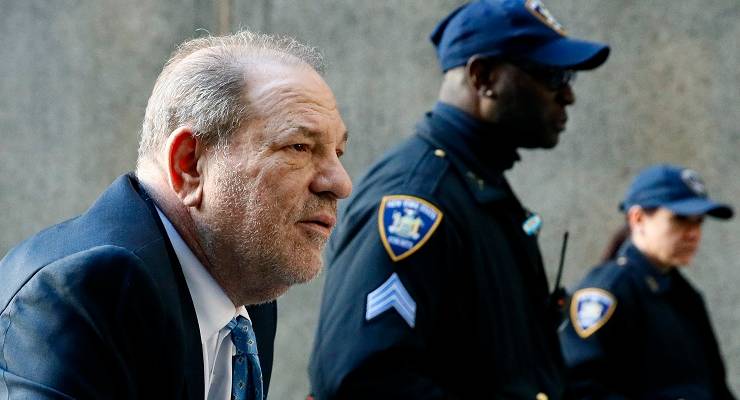
Overnight, a New York jury found disgraced film producer Harvey Weinstein guilty of rape, a decision that could re-energise the Me Too movement as far away as Australia.
When the allegations against Weinstein were first reported in 2017, it kicked off a global movement calling for accountability for perpetrators of sexual violence. High profile men in the media, politics and business were brought down over sexual misconduct allegations.
And while Australia was hardly insulated from that movement, two years later things seem to have stalled.
Can Weinstein’s conviction change that?
Can it save Me Too in Australia?
Weinstein’s conviction could be critical for the enduring success of Me Too in Australia, says Karen O’Connell, an associate professor in anti-discrimination law at the University of Technology Sydney.
“Weinstein’s conviction is very important, because a lot of people speak about what’s happening in America.
“We’re in a global environment, and even if we’ve been silenced here, people look to what’s happening overseas.”
A potential Weinstein acquittal might have seriously undermined the credibility of the movement.
“If the case had fallen over, that would’ve been really problematic,” O’Connell says.
“When a case like this is unsuccessful, people tend to think the behaviour didn’t happen, and that the women lied. It would’ve been a real blow to people’s perceptions”.
A moment stalled
Why did Me Too fail to take much ground in Australia?
With the allegations against Weinstein causing ripple effects across the world in late 2017, it didn’t take long for the Australian media to start fishing skeletons out of closets. In the world of entertainment, allegations of sexual harassment were made against Don Burke, Craig McLachlan and Geoffrey Rush.
Allegations also dented high-profile political careers. Barnaby Joyce quit as deputy prime minister after claims made by rural advocate Catherine Marriott. Luke Foley eventually resigned as NSW Labor leader after ABC reporter Ashleigh Raper accused him of groping her at a Christmas party.
But Australia never had the kind of mass reckoning we saw in the US. Instead, our institutions struck back, stalling progress right from the start.
“In Australia, we didn’t have a backlash because it more or less immediately happened,” O’Connell says.
Rush won his defamation case against The Daily Telegraph, which reported on complaints against him, and was awarded millions in damages (an appeal is due to be handed down shortly).
An internal investigation into Joyce proved inconclusive, and this month he was a handful of votes away from returning as deputy prime minister. McLachlan is the only figure in the post-Me Too era to face criminal charges in Australia.
Institutional barriers
The Rush trial points to some of the immense institutional barriers that continue to stand in the way of a reckoning with sexual harassment and sexual assault in Australia.
“I think things are changing, but in Australia they’re slowed down by institutional and legal barriers,” O’Connell says. “We have really strong defamation laws, so there’s a really strong incentive not to speak up.”
In Australia, a person or publication making allegations of sexual misconduct effectively bears the onus of proving it was substantially true in defamation proceedings. Unlike comparable jurisdictions, we lack protections for public interest reporting or a different onus for public figures as is the case in the United States.
Launching defamation actions, or even hinting at them, has become the default way of responding to sexual misconduct allegations.
Like Rush, McLachlan has launched defamation proceedings, which are pending the outcome of his criminal trial. Foley initially announced defamation proceedings, but eventually backed down after considerable criticism from his own party.
The odds stacked in favour of plaintiffs and the prospect of substantial pay-outs are enough to dissuade survivors, reporters and editors from telling the kinds of stories which brought down Weinstein.
Beyond defamation laws, our system for dealing with sexual harassment complaints is skewed towards keeping matters private and confidential. While this is desirable for many survivors, it has also contributed to a culture of silence around these issues, says O’Connell.
But those barriers exist everywhere, and with greater conversation and pressure they can slowly be broken down.
With Weinstein finally headed for prison, we could see renewed impetus for a cultural change we need.








Crikey is committed to hosting lively discussions. Help us keep the conversation useful, interesting and welcoming. We aim to publish comments quickly in the interest of promoting robust conversation, but we’re a small team and we deploy filters to protect against legal risk. Occasionally your comment may be held up while we review, but we’re working as fast as we can to keep the conversation rolling.
The Crikey comment section is members-only content. Please subscribe to leave a comment.
The Crikey comment section is members-only content. Please login to leave a comment.